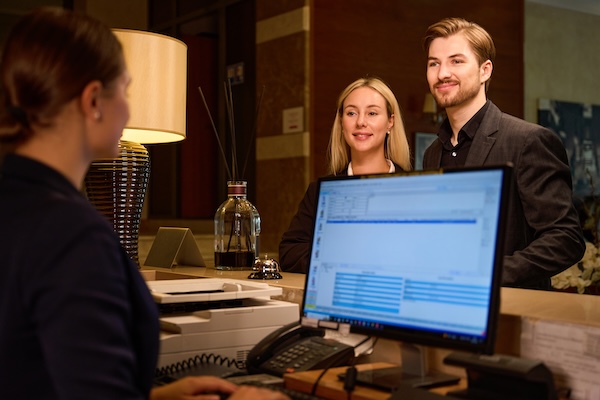Total revenue management: Hotel upselling across guest touchpoints
Total revenue management: Hotel upselling across guest touchpoints
When most people think of hotel upselling, they often think of it as offering a guest a bigger room at check-in. But today, upselling in hotels means so much more. Every single interaction you have with a guest — from booking to pre-arrival communications to in-person conversations — is an opportunity to create both value for your guest and revenue for your property. There’s just one key difference, and that lies in how you approach it.
Picture this scenario: Charles books a standard room at your hotel for a weekend getaway. Your reservation team processes the booking, but that’s the end of the interaction. No one asks if he’d like a late check-out. There’s no pre-arrival message offering him a discounted spa treatment. And he doesn’t receive an upsell email suggesting that he upgrade to a suite with a view.
It’s true that Charles still has a perfectly fine stay, but your hotel leaves thousands of potential dollars untapped.
If this scenario feels all too familiar and leaves a lump in your throat, don’t worry: This guide will show you how to change that story. By learning how to optimize your upsell and cross-sell strategies across all guest touchpoints, you’ll not only capture more revenue but also deliver the exact experiences that leave your guests more satisfied, loyal, and eager to return. Let’s dive in.
What is hotel upselling and hotel cross-selling?
Hotel upselling refers to encouraging a guest to purchase a higher-value product or service than what they initially booked. The most common example of hotel upselling is offering a room upgrade, but that’s not all. In fact, upselling can also mean adding options such as an early check-in, premium WiFi, or exclusive packages that elevate a guest’s experience.
Meanwhile, cross-selling is a little different. It involves suggesting complementary services that are not part of the original booking. Examples of cross-selling include offering dining reservations, spa treatments, or on-property activities like guided tours.
While both are essential parts of total revenue management, it’s easy to see how they’re quite different. Upselling increases the value of the core booking, while cross-selling expands guest spend into ancillary revenue streams. When you put the two together, you can maximize your profitability without taking on additional guest acquisition costs. And that’s a win for any hotelier!
Why upselling is critical for hotel revenue management
When done correctly, hotel upselling is not about pressuring guests into spending more. Instead, it’s about matching them with the experiences they’ll value most. Guests who feel understood and offered relevant choices are not only more satisfied, but they also spend more.
Even small upsell conversions add up quickly. For example, if a 150-room property secures a $50 upsell on even just 10% of stays throughout the year, that’s more than $270,000 in additional annual revenue.
This example demonstrates exactly why upselling is so powerful: It combines incremental revenue with stronger guest experiences. And thanks to tools like microsegmentation, hotels can now deliver these offers with precision — ensuring they’re relevant, timely, and guest-centric.
Total revenue management: Opportunities across the guest journey
Total revenue management means moving beyond thinking about the “room only.” Instead, it means thinking about every touchpoint as an opportunity to upsell or cross-sell in a way that makes sense for the individual guest. Here are a few examples of key touchpoints when you could upsell or cross-sell:
- At booking: Offer premium room upgrades, personalized packages, or flexible add-ons.
- Pre-arrival: Use email and SMS campaigns to promote your spa, restaurant, or other upgrade opportunities.
- On-property: Train staff at your front desk, in your restaurants, and at your spa to identify specific cues and make thoughtful offers.
- Post-stay: Promote hotel customer loyalty incentives or discounts for future bookings, encouraging repeat direct bookings.
Also, keep in mind that every department contributes to revenue success. Your F&B team can suggest meal packages while your spa staff can bundle specific treatments that appeal to certain guests. And your reservations team can set the tone with upgrade offers that make your guests feel special and truly seen. This coordinated approach ensures you’re capturing the full value of every guest relationship.
Training your reservation team for natural upselling
Many times, your reservations team is your guest’s first human interaction with your property — and that makes them a crucial channel for hotel upselling. But the key to conversion lies in training them to upsell naturally without being pushy.
Start by encouraging conversational techniques that identify guest intent. For example, if Diana books a weekend getaway, ask if she’s celebrating a special occasion — then suggest a suite or a package that aligns with the occasion. You can also provide scripts and role-playing exercises so your staff feel comfortable offering value-driven options. Additionally, incentivize your staff to recognize upsell opportunities as part of their guest service role.
For more practical guidance, check out The voice channel conversion playbook for hotels. It covers how reservation teams can use data and dialogue to personalize offers in real time.
Using email & SMS to drive upsell sequences
The world is becoming increasingly digital, and that means that your digital channels are an essential part of modern upselling. And the really great part of this is that you can automate your email and SMS campaigns to be timed to the guest journey so your offers feel helpful, not intrusive.
Consider sending pre-arrival upsells such as, “Upgrade to a suite with a view and enjoy a complimentary bottle of wine,” and onsite dining prompts such as, “Reserve your table now for Saturday evening and receive a complimentary dessert.” You can also communicate add-ons for convenience, like “Unlock early check-in for $30. Arrive when you want and settle in sooner.”
Just remember that personalization is key, so segment your guests by booking type, length of stay, or past purchases — and tailor their messages accordingly. For example, a business traveler might respond to flexible check-in or faster WiFi, while a couple on a romantic getaway might prefer a room with a better view.
Cross-selling techniques for spa, dining, and activities
Now, let’s not forget about optimizing your cross-sells, which offer some of the richest opportunities for ancillary revenue. The goal is to weave these offers seamlessly into the guest experience.
This may look like promoting spa treatment bundles pre-arrival or offering discounts for booking multiple spa services. Or you could include restaurant booking links in confirmation emails or offer wine pairings at check-in. Finally, you could partner with local providers for tours, excursions, or events and cross-sell them at the front desk or through email.
The key to increasing your revenue through cross-sells is integration across all channels — from your website and confirmation emails to in-person conversations.
How to measure upsell and cross-sell success
Without proper measurement, even the best strategy can stall. That’s why tracking by channel and offer type is so important: It ensures you know what’s working.
Here are some of the key metrics you should prioritize:
- Attach rate: % of bookings that include an upsell or cross-sell
- Average spend per guest: How much additional revenue you capture per stay
- Channel conversion rates: Performance by voice, email, SMS, or in-person
- Incremental revenue per booking: How much upselling increases the total booking value
- Guest lifetime value (LTV): The long-term impact of upselling on guest relationships
By tying your revenue back to specific channels and touchpoints, you can continually refine your upsell strategy to get increasingly better results.
Start optimizing your hotel upselling strategy today
Hotel upselling and cross-selling are not just sales tactics. Instead, they’re ways to create memorable guest experiences that naturally lead to more direct revenue. Remember, by training your team, leveraging email and SMS campaigns, promoting ancillary services, and tracking your results, you’ll capture the full potential of total revenue management.
And always keep this in mind: The goal is not to sell harder, but to serve your guests smarter by aligning offers with their needs so they feel deeply valued and truly understood.
Ready to take the next step? Complete the Upsell & Cross-sell Optimization track in The Direct Booking Mastery Certification and learn how to turn every guest touchpoint into a revenue-generating opportunity now and for years to come.
This site is protected by reCAPTCHA and the Google Privacy Policy and Terms of Service apply. View our Terms & Conditions here. *Required fields.





